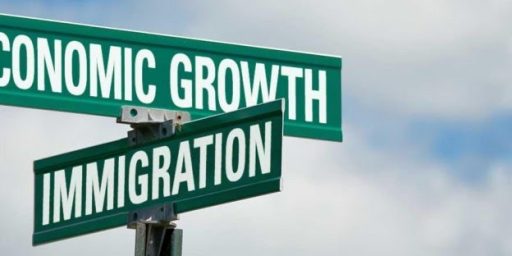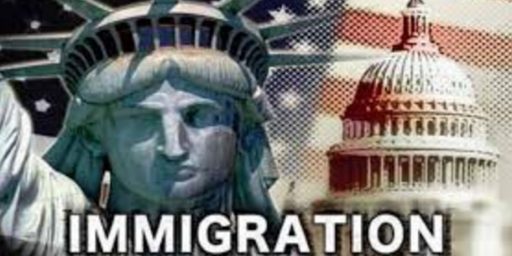Illegal Immigration the New Slavery?
The idea that illegal immigration is the new slavery of the 21st century is a risable notion. Slavery, as it has been seen historically is the outright ownership of one person by another. To come to the conclusion that illegal immigration is a new form of slavery we have to go through some amzaing mental gyrations (which are taking place on both the Left and the Right).
Daniel DiRito makes a game attempt at this redefinition. He notes that one definition of slavery is the “submission to a dominating influence”. He then goes on to try and argue that the American economy, by design, has let in illegal immigrants merely as a means “to bolster corporate profit” by promoting “poverty level wages”. The problem here is with the last part, promoting poverty level wages. This is basically the same kind of thinking that Karl Marx used. That profits are basically taken from labor, and if it weren’t for the evil capitalists, the laborers would get that profit in the form of higher wages. This completely ignores that supply and demand actually determine the wage rate, and individual employers tend to have little control over wages (if the opposite were true, you wouldn’t get a raise next time such things come around and you wouldn’t be able to leave since the next employer would either offer the same wage or a lower one).
One could take the approach that border security was allowed to go lax so that business could have an influx of cheap labor. To some extent this could be true, but this still leaves out the big question of what kind of impact does illegal immigration have on wages? There is research that suggests that the impact of illegal immigration on wages is small[1][2]. Although it is possible that instead of illegal immigration impacting wages, it operates through unemployment–i.e., the rate of unemployment rises for natives as illegal immigration rises. So the idea that illegal immigration “promotes poverty” is a dubious position with, at best, weak evidence (so far). Further, there is the possibility that unskilled labor from illegal immigrants is a complement for high skilled labor. That is, the addition of additional unskilled labor allows for people with high labor skills to earn more. The idea here is that the unskilled immigrant laborer allows the skilled laborer to devote less time to unskilled labor activities and more time to skilled labor activities thereby raising the incomes of the skilled laborer. Hardly a recipe for promoting poverty level wages. The net effect would at best be hard to determine, but the problem with the “illegal immigration = new slavery” crowd is that they don’t even make a casual attempt to determine the effect, they merely assume that the effect is large and negative and thus they are allowed to make the connection to slavery.
Dan Riehl doesn’t even offer the sophistication we got from DiRito.
Between special interest groups served by a growing underclass and big business special interests intent on maintaining a steady supply of cheap labor, it’s apparent to many in this debate who has the interests of America in their heart … and who is simply looking for access to the 2006 equivalent of, or next best thing to slaves.
Here the assertion is merely made that illegal immigrants are equivalent to or the “next best thing to” slaves. However, most illegal immigrants satisfy the following list:
- They come to this country voluntarily (albeit illegally, and often at risk to their lives),
- They voluntarily take a job that a employer voluntarily offers to pay,
- They can leave that job and look for another,
- They can live where the please (and can afford),
- They are free to spend their money as they see fit.
Not quite in line with the definition of slavery. To be sure there are cases of forced labor even the U.S., however, from what I have been able to find so far, such cases are more the exception than the rule. In fact, anti-illegal immigration folks like Michelle Malkin frequently enjoy pointing out that illegal immigrants aren’t “in the shadows” (and hence not likely to be subject to forced labor). And to the extent that forced labor is a problem, a well run guest worker program and an amnesty plan for those already here would solve that issue to a large extent as well.
No compared to actual slavery such as was the case in the U.S. lets look at Radley Balko’s take on it,
Now — and I can’t believe I even have to do this — let’s talk about fucking slavery. See, Mr. Riehl, with slavery, Africans were kidnapped from their homes, from halfway across the world. They were packed into ships against their will, like meat. They were beaten and bred like animals. They were murdered if they resisted. They were bought and sold as if they were mules. They were routinely ripped from what little semblance of family they were permitted to have if their “employer” wished to sell them. Slaves who escaped (i.e., “looked for other employment”) were whipped, shot, or lynched. And all of this went on for generations.–emphasis in the original
Seems there is some problems with the definitions here.
_____
[1]Hanson, Gordon H., Raymond Robertson, and Antonio Spilimbergo. 2002. “Does Border Enforcement Protect U.S. Workers from Illegal Immigration?” Review of Economics and Statistics 84(1): 73-92.
[2]Borjas, George J. 1999. “The Economic Analysis of Immigration.” In: Orley Ashenfelter and David Card, eds., Handbook of Labor Economics, Vol. 3. Amsterdam: Elsevier, pp. 1697-1760.






One other point to add. In addition to the voluntary coming to the US, free to quit, etc., they also have the freedom to send wages home and return where they came from. Given any definition of slavery in history (Roman, viking, feudal peasants, US slaves, Jews under the Nazis) and you can see that the freedom to stop and go somewhere else is a the big thing lacking in all those past slaves. Now if you want to claim that they are under economic duress to come here for a job and stay here, then I am a slave also. I can think of things I would rather be doing than the work I do, but the roof over the head, food on the table, clothes on the back, etc. force me into my slavery to work. The number of people these things don’t “force into slavery” is pretty small.
I certainly agree that the two activities don’t compare, either on a moral or legal level. That said, I have significant problems with some of the proposals for guest worker programs that have been floated… I’ve seen such concepts used in various middle eastern countries, and while it still doesn’t quite equate to slavery per se, it’s not very different from indentured servitude…
Legion,
I can understand having reservations about a government administered guest worker program…we are talking about the government after all. However, typically indentured servants have a contract where they work for a period of time for no pay and just accomodations, food, etc. So a guest worker program is above that. And since an indentured servant is technically above a slave, a guest worker is far from a slave…by any definition.
Or as yetanotherjohn noted, if guest workers and illegals are (wage) slaves, then so am I and I think I make pretty decent money.
is balko so illinformed as to believe slavery was somehow practiced only in america and only by whites owning blacks? that amounts only to a provincial form of racism.
No, but that is the type of racism that was practiced in the U.S. And racism elsewhere in the world tends to look pretty much the same save for a change in the races, so overall his point still stands.